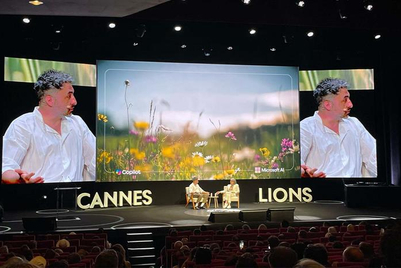
At Cannes Lions, a panel on “The Death of Masculinity and its Impact on Creativity” promised to shift the gender focus from the prevailing discussion about women, gender equality and the impact of the #metoo movement to look at what the future holds for men.
“There’s so much focus on women. The future of masculinity is more fascinating” said futurist moderator Faith Popcorn, who staged the discussion. While there was sadly little discussion on the impact on creativity, there was plenty of talk of about the death of masculinity.
Popcorn trotted out various statistics to reflect how males may be in trouble in the future: women opening new businesses at twice the rate of men, women getting more university degrees, testosterone levels dropping by 17% worldwide and diagnoses of depression rising among men — not to mention the nervousness felt by men about the #metoo movement and dealing with women in the workplace.
“What about poor men?” posited Popcorn, noting that the recent amplification of the gender equality movement is just getting started.
Wisely, Popcorn’s panelists didn’t take the bait but instead put the changes into perspective. “The men hold the position of power… the patriarchy, that construct is still very alive and well” noted Amy Nelson, former litigator, Obama campaign organiser and founder of female-oriented working space firm The Riveter. “We still live in a world where there are more CEOs named John in America than women [CEOs].”
So what has really changed? “Surveys suggest that in the last five years there’s been a shift in ideology," said Michael Kimmel, author of 'Angry White Men' and professor of gender studies at Stony Brook University. Male behaviour at home is changing, where more men recognise they have a greater role in sharing the load to make households and relationhips work. “What’s different now is that men are starting to say that’s part of being a man – being loving and kind.”
The impact on advertising
That ideological shift has been slow to make its way into advertising. Interestingly, when asked what represented the old style of masculinity, Kimmel and Nelson both cited the character of Don Draper in ‘Mad Men’, reflecting the role of media in building male stereotypes, as opposed to names like Barack Obama and Justin Trudeau who Nelson claimed represented a new model for masculinity.
But advertising is changing. Popcorn cited the example of Unilever’s Axe brand of male grooming products, which shifted the tenor of its advertising from portraying beefy men using Axe to attract women, to an “It’s okay to be” ad which portrayed men as sensitive, at times doubtful.
Kimmel noted that the premise for the first ad was to provide a product for men who didn’t feel masculine enough but needed help to get there. But the second ad appeals to qualities that men actually already have and is therefore easily much more relatable to them. This then, perhaps reveals a new future for masculinity within creative work.
What may be most surprising is how long it has taken advertising to recognise this.
“It used to be media affecting us. Now it’s us affecting media,” added drag queen and TV personality Violet Chachki. “Now its brands trying to keep up with what consumers want.”


.jpg&h=334&w=500&q=100&v=20250320&c=1)



.png&h=334&w=500&q=100&v=20250320&c=1)



.png&h=334&w=500&q=100&v=20250320&c=1)


.jpg&h=268&w=401&q=100&v=20250320&c=1)


.png&h=268&w=401&q=100&v=20250320&c=1)
.png&h=268&w=401&q=100&v=20250320&c=1)
.png&h=268&w=401&q=100&v=20250320&c=1)
